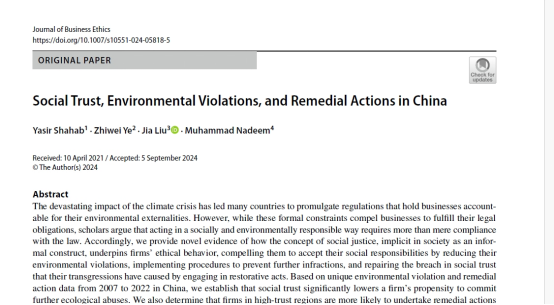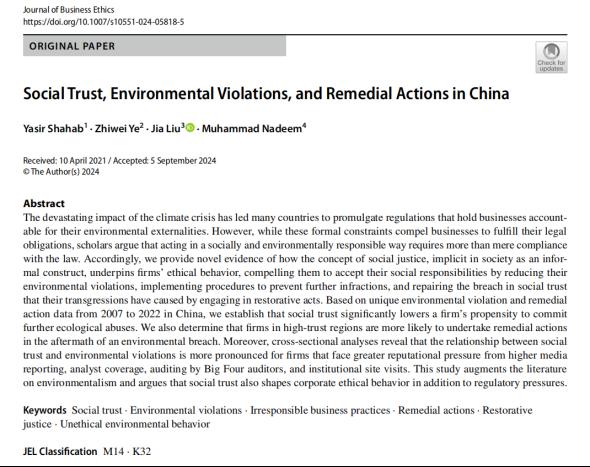近日,会计学院Yasir Shahab博士在FT50排名的期刊《Journal of Business Ethics》上发表了标题为《Social Trust, Environmental Violations, and Remedial Actions in China》的文章。这是Yasir Shahab博士在2021年12月获得的国家自然科学基金外国青年学者研究基金项目资助下完成的主要论文之一,也是西京学院会计学院教师在FT50期刊中发表的第一篇论文。

该研究提供了新的研究证据,证明了社会正义作为一种非正式的结构隐含于社会中,如何支撑企业道德行为。它促使企业通过减少环境违规行为、实施防止进一步违法行为的程序,以及修复因其违法违规行为而导致的社会信任缺失来承担社会责任。该研究基于2007年至2022年中国独特的环境违规和补救措施数据证实,社会信任显著降低了企业进一步破坏生态的倾向。该研究还标明,高信任地区的公司更有可能在环境违规后采取补救措施。此外,横截面检验表明,对于那些因媒体报道、分析师报道、四大会计师事务所审计和机构实地考察等而面临更大声誉压力的公司来说,社会信任与环境违规行为之间的关系更为显著。该研究补充了环保主义的相关文献,认为除监管压力外,社会信任也会塑造企业道德行为。
据悉,Financial Times 50 Journals期刊是英国《金融时报》(Financial Times)经广泛咨询,选出的50份全球最有份量的商学学术期刊(简称FT/50),作为它每年的商学院评级标准,用以衡量各商学院的研究质量。
论文在线链接:https://link.springer.com/article/10.1007/s10551-024-05818-5
Dr. Yasir published a paper in Journal of Business Ethics (FT50-ranked journal)
Recently, Dr. Yasir Shahab, from the School of Accounting, published in a FT50-ranked journal i.e., Journal of Business Ethics. The title of the paper is“Social Trust, Environmental Violations, and Remedial Actions in China”.This is one of the main papers related to Dr. Yasir Shahab’s completed national project under National Natural Science Foundation (NSFC) project for Research Funds for International Young Scientists (RFIS-1) which he won back in December 2021. This is also the first FT50 paper in the School of Accounting, Xijing University.
This paper provides novel evidence of how the concept of social justice, implicit in society as an informal construct, underpins firms’ ethical behavior, compelling them to accept their social responsibilities by reducing their environmental violations, implementing procedures to prevent further infractions, and repairing the breach in social trust that their transgressions have caused by engaging in restorative acts. Based on unique environmental violation and remedial action data from 2007 to 2022 in China, this study establishes that social trust significantly lowers a firm’s propensity to commit further ecological abuses. The study also determines that firms in high-trust regions are more likely to undertake remedial actions in the aftermath of an environmental breach. Moreover, cross-sectional tests reveal that the relationship between social trust and environmental violations is more pronounced for firms that face greater reputational pressure from higher media reporting, analyst coverage, auditing by Big Four auditors, and institutional site visits. This study augments the literature on environmentalism and argues that social trust also shapes corporate ethical behavior in addition to regulatory pressures.
The full paper is available here:
https://link.springer.com/article/10.1007/s10551-024-05818-5



